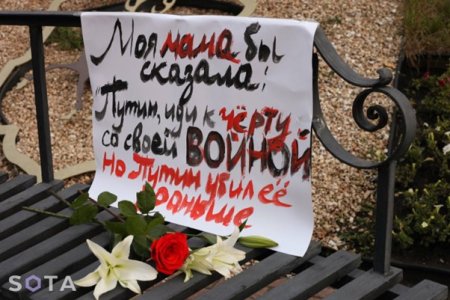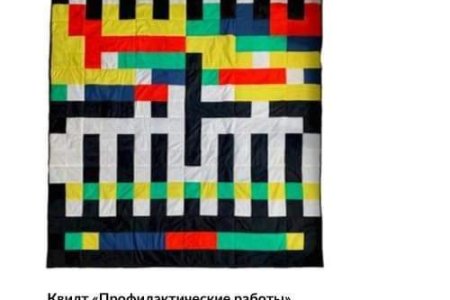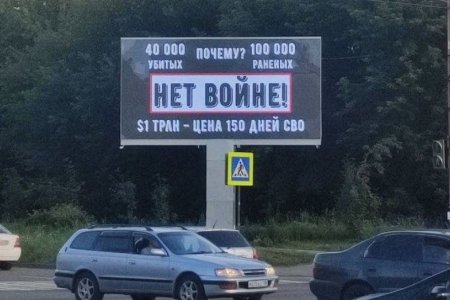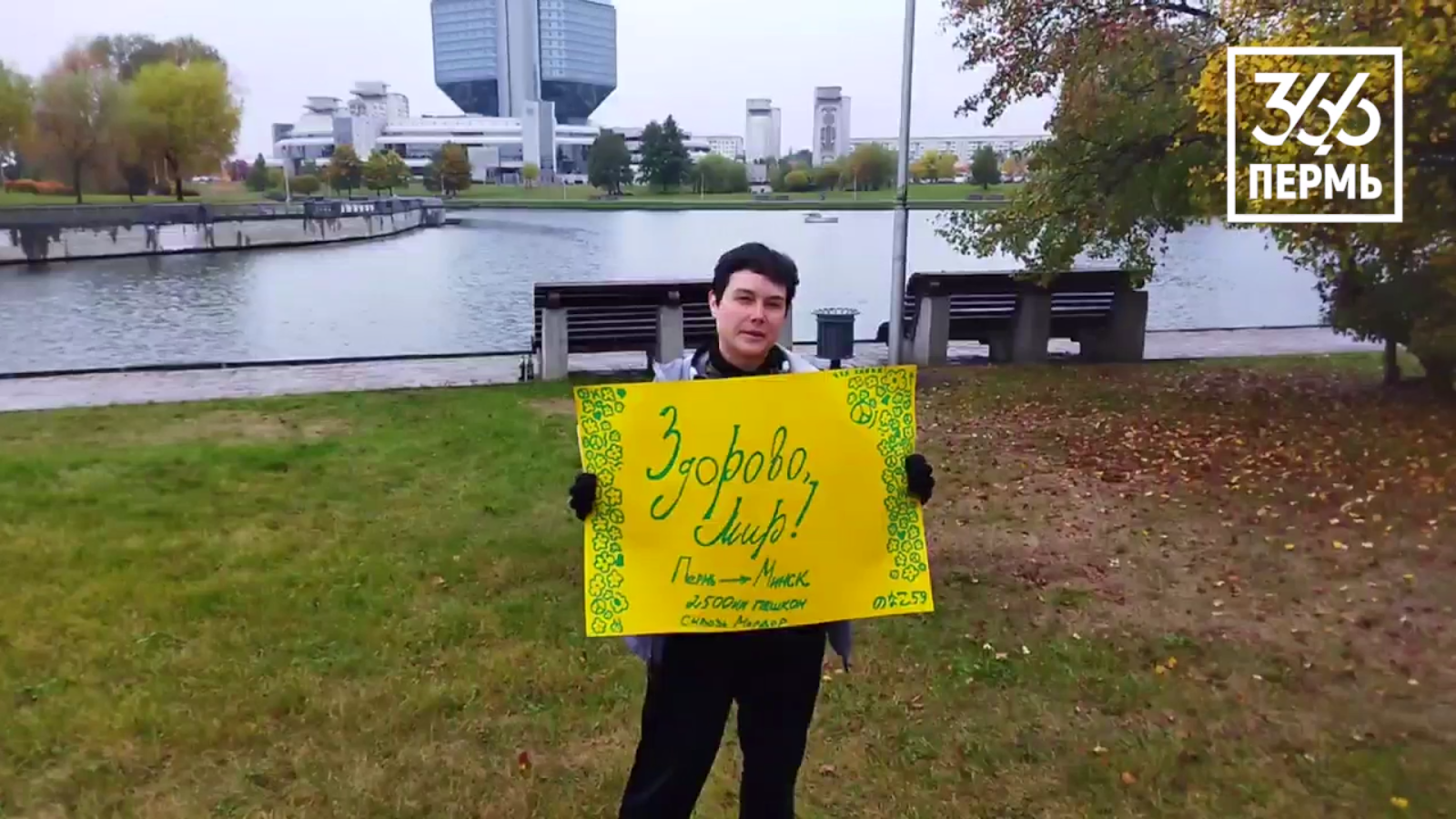
Activists and horizontally-organised bodies concentrated on helping refugees arrested during earlier protests and those trying to avoid the draft or leave Russia.
The biggest protest of the week
During the night of Monday 10 October, a photographer at the Moscow Mayor’s Office circulated an anti-war message to tens of thousands of public employees.
43-year-old Oleg Sidorenko has worked for the Moscow architecture department for the past eight years, taking photos of Moscow buildings and adding them to the city’s photo archives. On 10 October, he circulated his anti-war release to tens of thousands of addresses, many of which he copied by hand from the archive database: he was denied access after reaching ‘S’ (the 17th letter in the Russian alphabet). The regime, Sidorenko wrote, was depriving Russian citizens of their rights with “lying speeches” about a “holy war” while it committed “crimes against humanity”. He called on recipients of his letter either to resign or leave the country. If they could not do either then he recommended that they “support each other, unite and stand up for the truth”.
He received replies to his circular and, for the most part, they were positive. Later Mediazona interviewed Sidorenko, “ ‘Do not be afraid of protesting and speaking out’: a photographer with Moscow Mayor’s Office has circulated an anti-war text to tens of thousands of local government employees”.
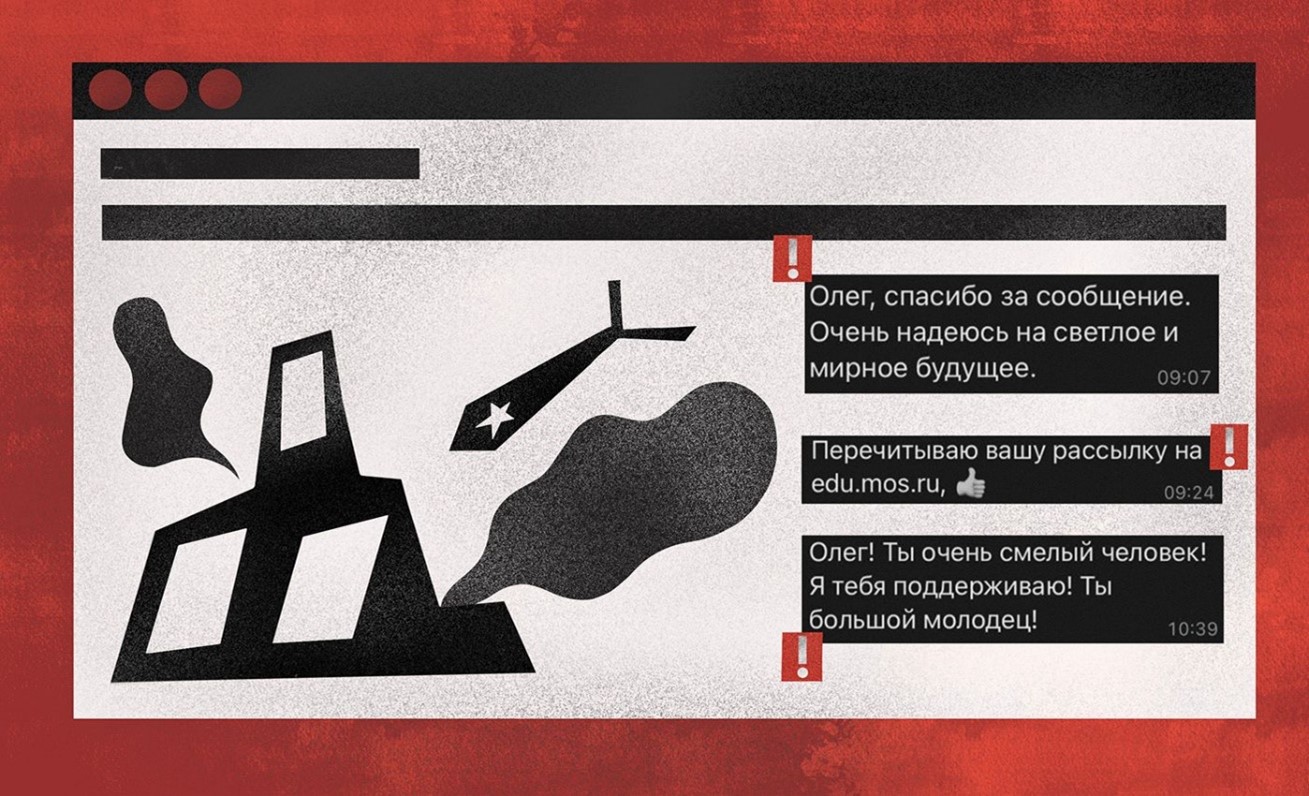
“I’m reading your message on edu.mos.ru”
“You’re a brave chap, Oleg! I support you. You’re a great guy!”
Courageous individuals
Between Monday and Sunday, people were arrested for protesting against the war and the draft in cities across Russia: in Siberia (Novosibirsk), the Volga District (Nizhny Novgorod), Moscow and St Petersburg, and in several Far Eastern cities (Vladivostok, Khabarovsk and Yakutsk).
Demonstrators were fined for protesting against the draft by courts in Siberia (Novosibirsk, Tomsk), the Volga District (Kazan, Samara), Northwest Russia (Arkhangelsk), South Russia (Aktyubinsk, Kamyzyak and Sochi) and the North Caucasus (Nalchik and Dagestan, the Tabasaransky district). Fines ranged from 10,000 to 30,000 roubles. OVD-Info reported that the fines were imposed for solitary street protests, videos posted on the Classmates social media, and sticking up anti-war flyers.
*
In Yekaterinburg (Urals) the police brutally arrested a man holding a one-man, anti-war protest in the city. He stood on Labour Square with a placard reading, “No to the War”. Policemen twisted his arms behind his back and drove him to the police station, reported the Evening News paper. He had come to the city from another town.
A video of his brutal arrest was posted online.
*
Vladimir Mikhailov, a deputy with the Kostroma Region Duma (Central Russia), protested against the intensifying conflict between Russia and Ukraine outside the entrance to the duma, in order to “stop the bloodshed”, holding a placard opposing the shelling of Ukraine. A man tore the placard from his hands and threatened him. Mikhailov took out a second placard, but several men came up to him and took it off the deputy (reported by 7 x 7, “Horizontal Russia”).
A lesson in visual subversion
Schoolchildren in Cheboksary (Chuvashia, Volga) were given a homework task of anti-war drawings by their arts teachers at schools No 22 and 65. The idea was to send Russian soldiers pictures by young schoolkids on the theme “No to the War”. Directors of the schools would not talk to journalists. At the Ministry of Defence in Moscow, officials said they were “indignant” (reported by 7 x 7, “Horizontal Russia”).
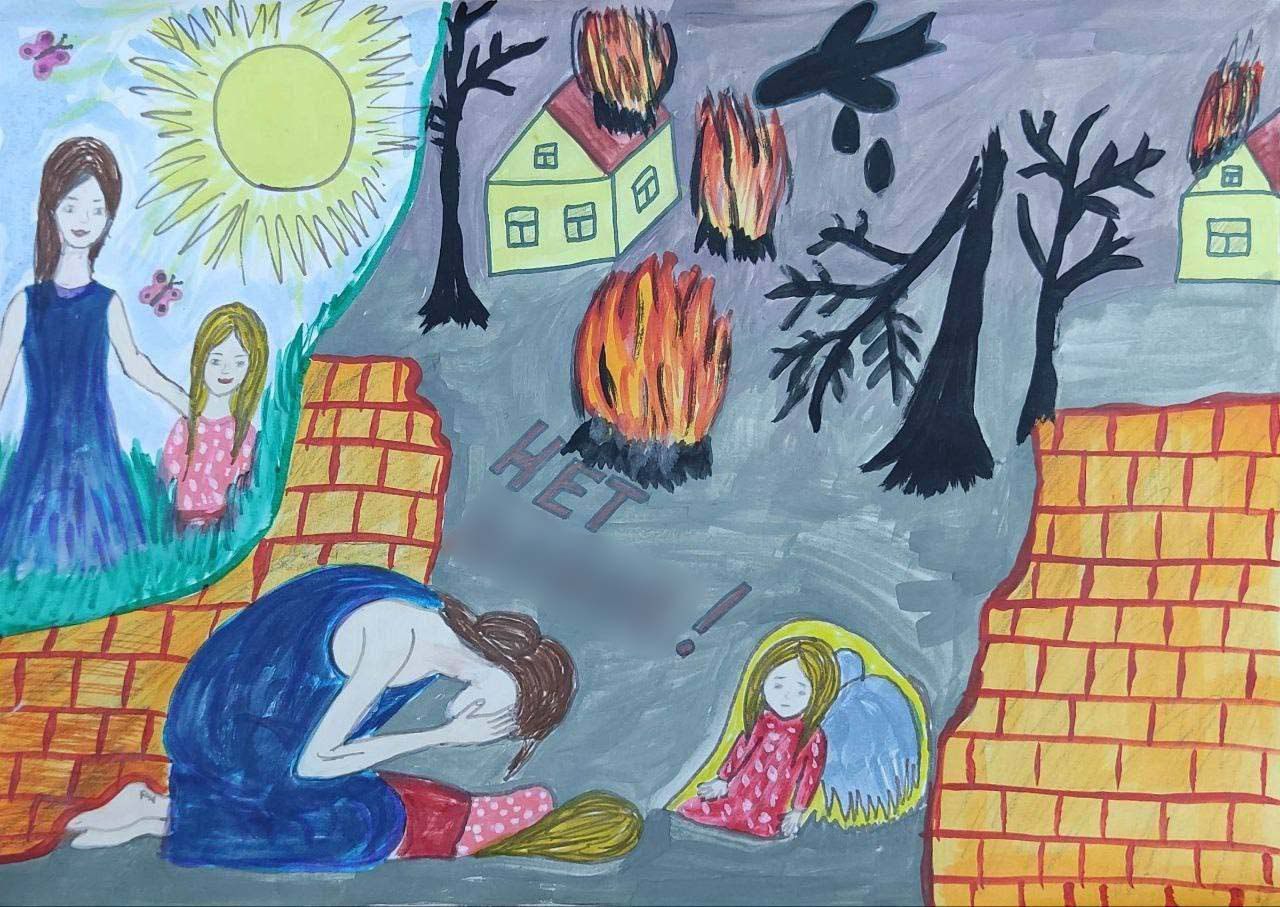
Hackers against the War
After breaking into the site of the Party of Growth, hackers posted anti-war statements there.On the page “What about Titov?” [Party leader Boris Titov]unidentified persons announced that they were setting up a party to be called the People of Growth.
Its members want to end military operations in Ukraine, put activists in power and make the transition to an economy based on competition and the growth of business. Later the site could not be accessed.The Party of Growth press service said that the site had been hacked and specialists were trying to remove the faults. (Reported by 7 x 7, “Horizontal Russia”)
Who’s stayed and who’s left
This week the High Lama of Kalmykia (South Russia) left the country. The Shadjin-Lama Telo Tulku Rinpoche has spoken out against military operations in Ukraine. “The Ukrainians are defending their country, their land,” said Telo Rinpoche, “their truth, their Constitution and their people.” (Reported by 7 x 7, “Horizontal Russia”)
*
Yekaterinburg journalist Yelena Shukayeva has emigrated to Germany. She left Russia at the end of September, she told the Evening News.
Shukayeva wrote for Radio Liberty, Novaya gazeta and Vot Тak TV (part of the Warsaw-based Belsat project). She was also local coordinator for the Last Address project, which commemorates the victims of the Soviet regime.
In August Shukayeva was imprisoned for a fortnight for posting a five-year-old video made by Alexei Navalny. When she was in the temporary detention centre, she went on a hunger strike. She was also fined 200,000 roubles after being charged several times with ‘discrediting’ the Russian army. Subsequently, the Ministry of Justice declared her to be a “foreign agent”.
*
The chairman of the Karelian Union of Journalists, Georgy Chentemirov, has left Russia with his family. He said he could no longer have anything to do with a “destructive” war that was “no use to anyone”. What was happening in Russia was, in his words, a “catastrophe”.
In September, the State-owned New View online media outlet accused Chentemirov of holding anti-Russian views. He had asked for an investigation into the legality of banning the word “war”. Thereafter he was harassed on social media and a veteran of the Ministry of Internal Affairs asked the prosecutor’s office to check whether the journalist was being financed from abroad. More than fifty journalists signed a letter in support of Chentemirov, saying he was “well-known for his honesty and principled behaviour” (reported by 7 x 7, “Horizontal Russia”).
*
The head of the contemporary arts department at the Hermitage in St Petersburg has resigned from the museum and abandoned all Russian projects because of his disagreement with the war in Ukraine. Dmitry Ozerkov has curated all the Hermitage’s most famous exhibitions of contemporary art. He left Russia in February and has now spoken to Bumaga online about his anti-war views. (Reported by Bumaga today)
2,500 kms on foot “through Mordor”
A protestor has completed her 2,500 march on foot across Russia to Minsk, capital of Belarus, as a demonstration of her opposition to military operations in Ukraine (see Digest [E], 17-26 July).
Along the way, 29-year-old Nonako from Perm (Volga) talked to people about the war and gathered money for political prisoners in Russia and Belarus. She chose Minsk as her destination because the citizens of Belarus “are fighting for their freedom” and differed from the inhabitants of Russia in their solidarity, mutual support and compassion. All the hotels and apartments in Minsk, she commented, were filled with people fleeing the draft.
At the end of his weeks-long protest Nonako held a one-woman demonstration with a placard calling for peace: “There’s no turning back […] Catch fire, you survivors, blaze and light the world. We’re not alone. Do not forget this and conquer fear with kindness to one another. Peace!”
Arson attacks continue
Enlistment & Recruitment Offices (voyenkomat), banners, administrative offices and symbols of the war.
In Krasnoyarsk (central Siberia) an unidentified person tried to set fire to an Enlistment & Recruitment Office. At 4.30 am on Monday 3 October, reported the NGS24 media outlet, someone entered the grounds of the Office and threw two bottles of inflammable liquid at the window (reported by 7 x 7, “Horizontal Russia”) A film of the arson attempt you can see here.
*
A schoolgirl from Kazan (Tatarstan, Volga) who threw a Molotov cocktail at an Enlistment & Recruitment Office was placed under house arrest for two months. On the night of 2-3 October, she threw two bottles at the Soviet district office. She did it, she told law-enforcement officers, because she did not support the war in Ukraine or the draft.
The Class 11 pupil will remain under arrest until 3 December. She was brought to the court in handcuffs after spending the previous two days in a temporary detention centre (reported by Idel Realities).
*
Someone has attempted to burn down an Enlistment & Recruitment Office in Krasnodar (South Russia). On the night of Thursday 6 October, an unidentified person threw a bottle of inflammable liquid at the office premises. The caretaker and two military conscripts managed to put out the firebefore the emergency services arrived.
The arsonist, who wore a hood, is being sought by the police. Preliminary information has identified a 42-year-old woman from Krasnodar.
*
Unidentified persons set fire to the Enlistment & Recruitment Office in the Arkhangelskoe settlement (Bashkortostan, Volga). Locals posted photos of the damage, which appear to show that one office was affected. The district administration confirmed to journalists that a fire was started.
*
This is the updated map of arson attacks on Enlistment & Recruitment Offices [voyenkomat] across Russia (reported by 7 x 7, “Horizontal Russia”).
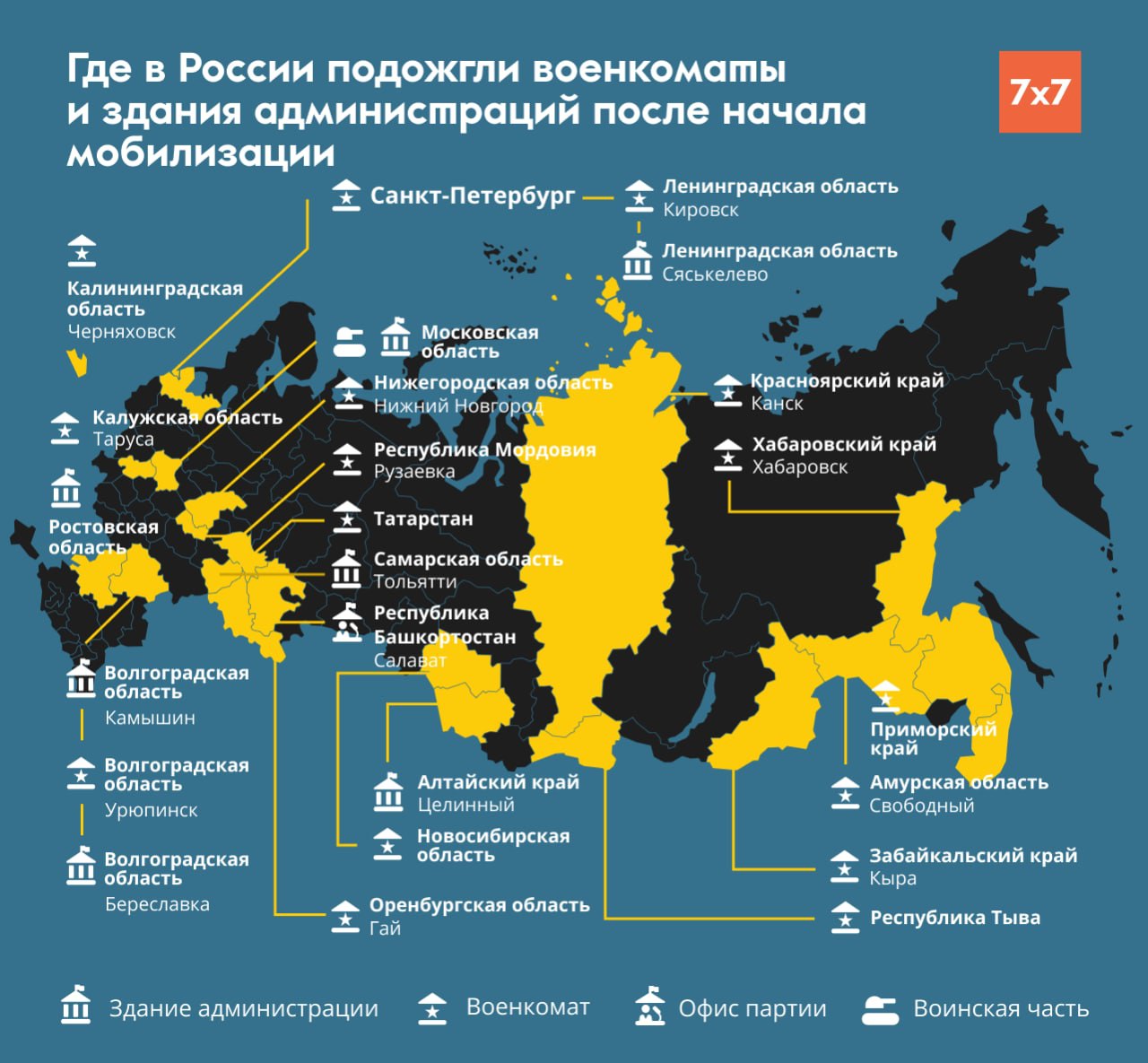
*
Two teenagers in the city of Ulan-Ude (Buryatia, east Siberia) set fire to a V(ictory) banner draped across the plinth of the largest sculpted head of Lenin in the world. Earlier there was a Z banner there but it was damaged by persons unknown.
Later the police arrested two 17-year-olds for the offence. They were forced to record a video clip admitting their guilt. Both have been charged with vandalism under Article 214 of the Criminal Code. (Video of the banner catching fire)
*
In the Komi republic (Northwest Russia) unidentified individuals smashed and covered in red paint a plaque in memory of ‘Motorola’, a fighter of the “Donetsk people’s republic”. Local officials put up the plaque in honour of Arsen Pavlov in June on school No. 13 in the Dalny settlement. At first, the Ukhta mayor’s office suggested that the school be renamed after Pavlov, but local inhabitants objected.
*
In Yekaterinburg (Urals) someone smashed the window of a vehicle decorated with the letter Z. A masked man was seen walking around the parking lot, an eyewitness said, looking at the cars and when he saw the Z-sticker he pulled out an axe and struck the car window eight times.
The vehicle’s owner reported the incident to the police. Prior to that persons unknown poured red paint over a minibus in Yekaterinburg with Z and V stickers.
The media and anti-war projects
The Dozhd (Rain) TV channel has shown a film about protestors against the war in Russia, activists in various towns and cities who were not afraid to express their views.
Many heroes of this digest figured among them: a stoker from Vologda (Northwest Russia) found himself in the Investigation & Detention Centre [SIZO] for setting up an underground radio station; an actress honoured in Russia; a Ukrainian from Volgograd (South Russia) who’s been fined more than anyone else for ‘discrediting’ the Russian army; a builder from Nalchik (North Caucasus) who asked that a Z-sticker be removed from a motor vehicle; a famous creator of graffiti; and many other citizens of Russia who have spoken out against the war – they are among four thousand protestors charged with ‘discrediting’ the Russian army or the 116 who face criminal charges.
A report by the Partisan Wave on Dozhd’s YouTube channel is here.
*
The Feminist Anti-War Resistance has launched an “Anti-war Inktober” on its channel. The Inktober is an annual drawing competition held in October by artists all over the world. This year FAR has proposed its own competition:
“In 2022, we in the Feminist Anti-War Resistance have announced an Anti-War Inktober and offer you a list of the drawings for each day of the month.”
Each day, drawings on anti-war themes will be posted on the FAR channel. You can view them at the #antiwartober and #antiwartober2022 tags.(Reported by Feminist Anti-War Resistance)
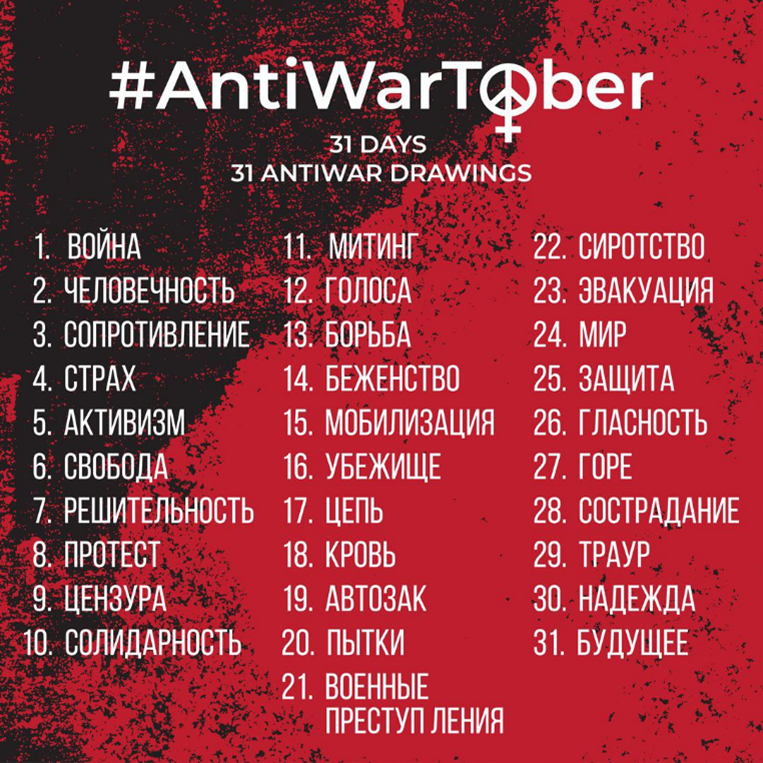
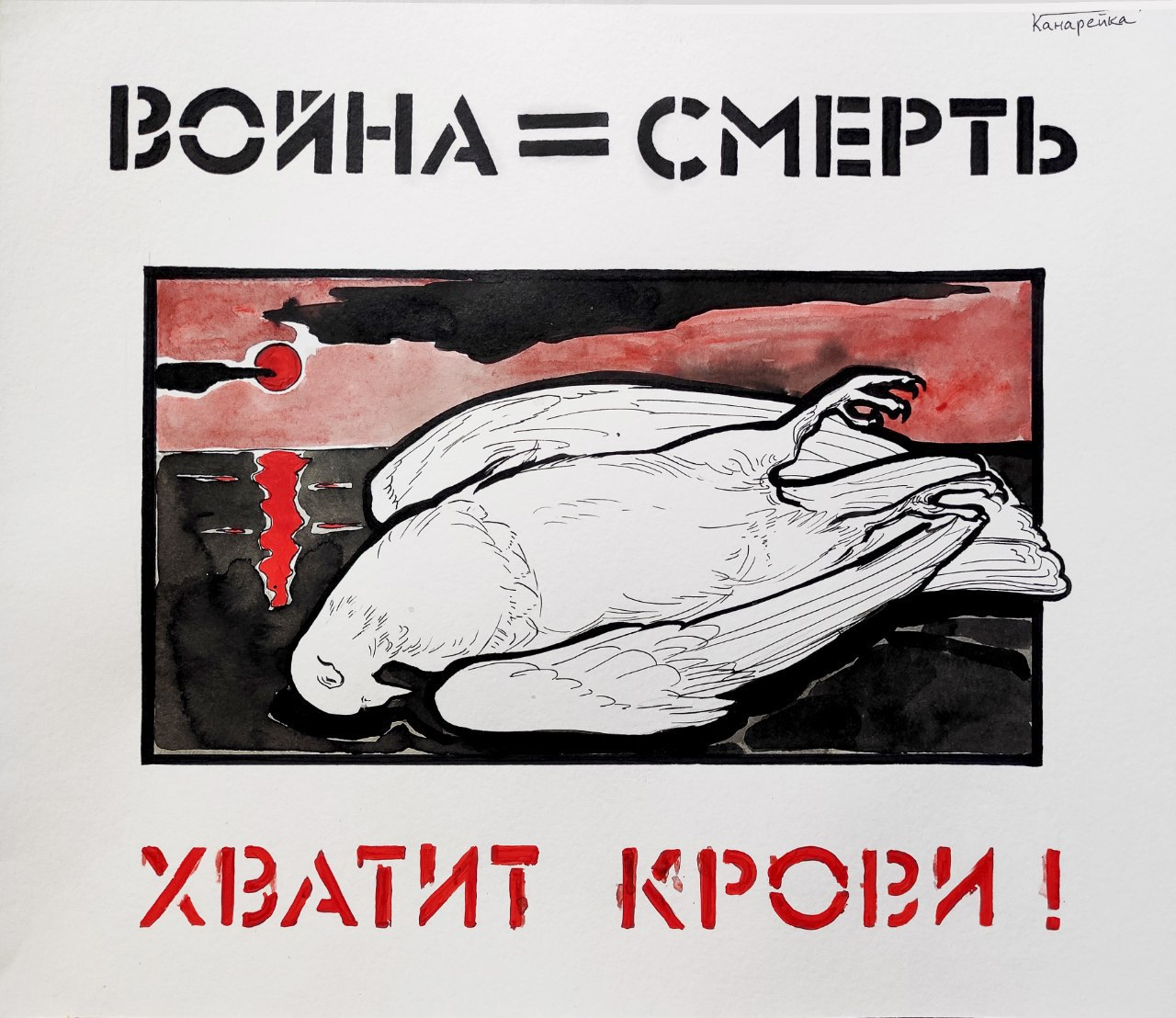
*
Five months ago, journalists at the independent TV2 channel created the “Eyewitnesses” project. Since then, hundreds of people have told how their lives changed after the war began in Ukraine. The journalists received contributions through a bot (the Eyewitnesses channel).
Illustrations and street texts
Alexander Pravdin in the town of Siversky (Northwest Russia; see Digest [E], 23-29 July) has put up new posters in his street “paper” (reported by Bumaga today).
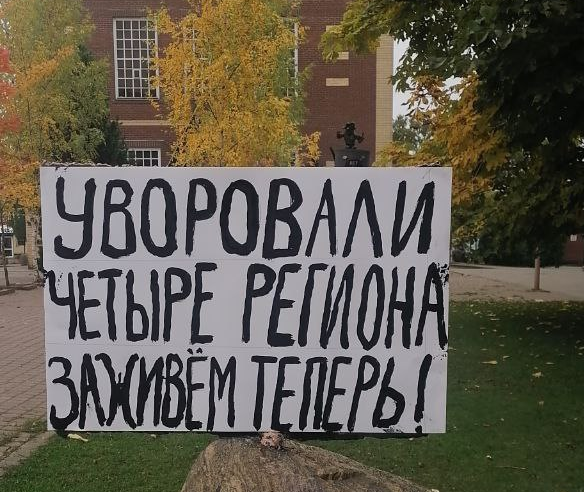
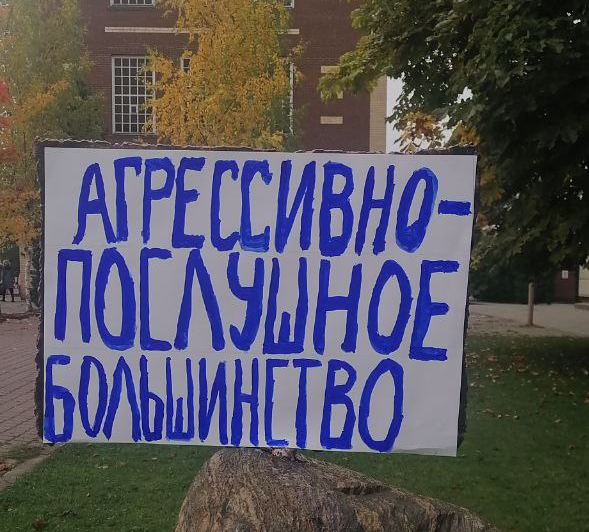
*
Another photo of anti-war street art. The source contains many more such pictures (Reported by Bumaga today)
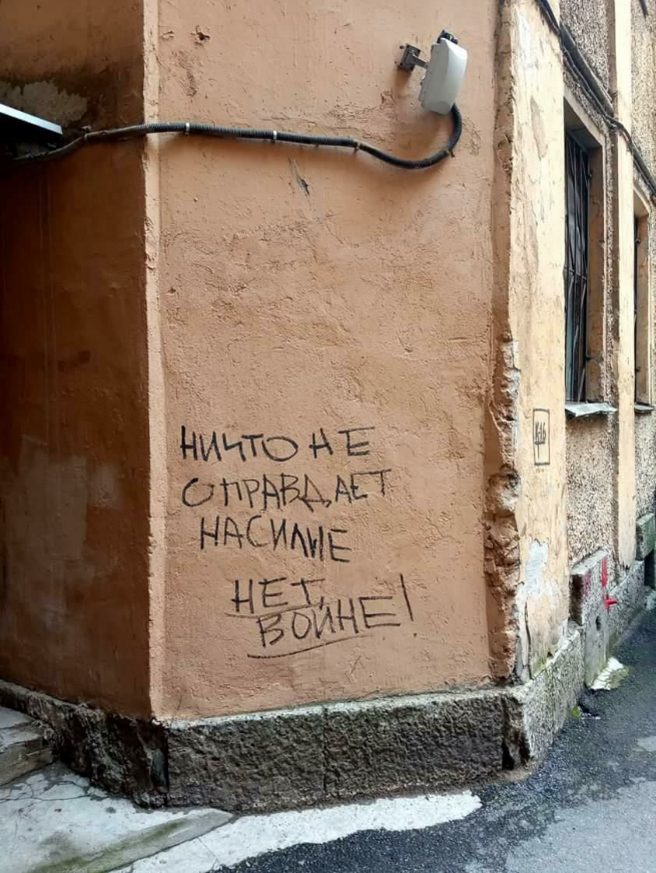
“Stand up for your convictions, even if it seems you stand alone!”
A graffito quoting Sophie Scholl of the wartime anti-Nazi movement in Germany, has appeared in Moscow. Scholl and her older brother Hans were members of the White Rose student opposition group which held peaceful protests, distributed flyers and wrote graffiti on walls. Hans and Sophie were arrested and sentenced to death on 18 February 1943. On 22 February they were put to death using the guillotine. Sophie was 21 years old.
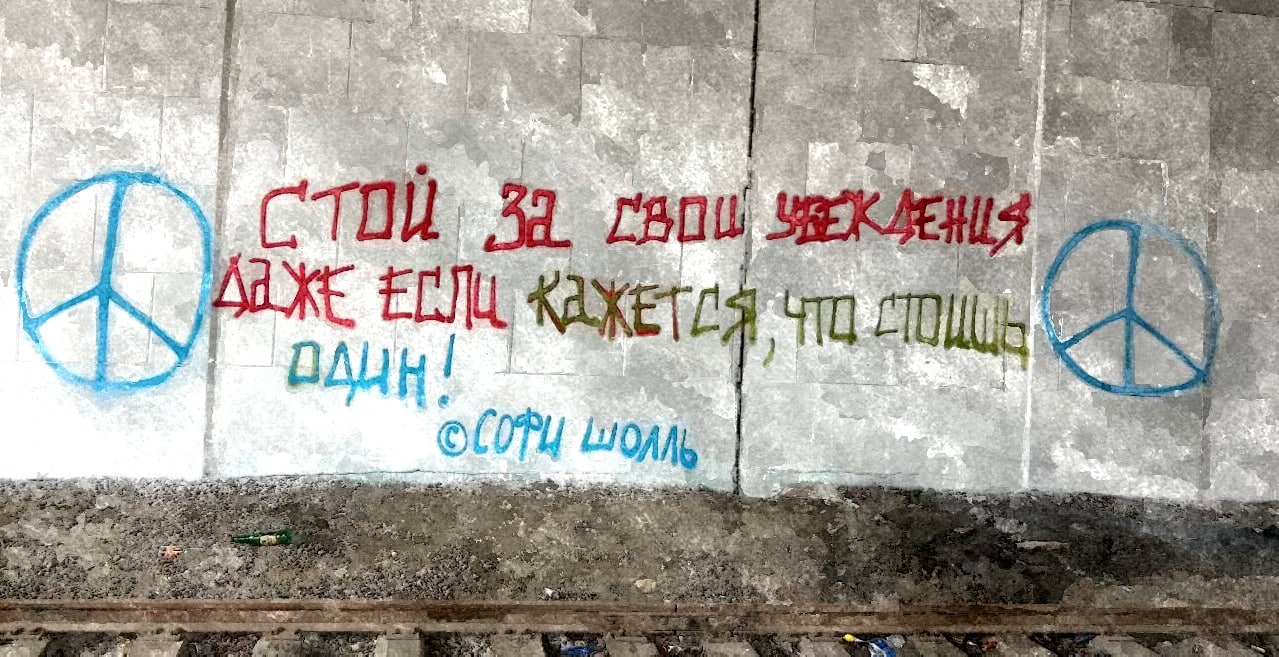
*
The “lamp-post” charitable book market in Nizhny Novgorod (Volga) has been cancelled at the insistence of the authorities. Writers Oksana Vasyakina and Yevgenia Nekrasova were due to speak at the event which was raising funds for the women’s crisis centre in the city. The two women are well-known for their opposition to the war.
The theme of the market would have been “Non-Violence”; it was planned to discuss how to resist violence and where to find the resources to support the anti-war community inside Russia. The venue received a call from the FSB demanding that the event be cancelled, because of the speakers’ pro-Ukrainian views.
Punishment for past protests
During the first week after partial mobilisation began people in Russia and around the world were impressed by the protests of women in the North Caucasus (in Kabardino-Balkaria, Dagestan and Chechnya).There was a terrible response to their protests this week.
Rights activists report that the arrested women were brought to the Grozny administration building (Chechnya) where their husbands beat them with pipes filled with concrete – otherwise, they were told, the FSB and police officers would do it themselves.
Memorial reports that Adam Muradov, whose wife took part in an anti-war rally in Chechnya on Wednesday 28 September fell ill during prayers at the mosque and died of a heart attack. His son was then sent to fight in Ukraine as part of Russia’s armed forces.
Memorial sources in Chechnya say that the FSB has been pressurising the Muradov family, demanding that they say on camera that they were not subject to any unlawful treatment. (Also reported by Horizontal Russia).
Those who took part in late-September protests and rallies
In Moscow participants in the anti-war protest on 22 September were first jailed for 10 days under Article 19.3 (Administrative Offences) for “refusing to obey the police”. Then they were fined up to 250,000 roubles for repeated violation of the legislation concerning ‘rallies’ (Article 20.2, pt. 8, Administrative Offences), reports OVD-Info.
*
Vlada Antomoshkina, arrested at the 24 September protest was sent to Psychiatric Hospital No 1 after slitting her wrists at the police station. On Monday 3 October, reports OVD-Info, she was met released from the hospital but not met by her lawyer but by the police who drove her to court.
*
Arrested men of draft age at the Gatchina temporary detention centre were issued with a summons to report to the Enlistment & Recruitment Centre. Protestors from St Petersburg, arrested for demonstrating against the draft, served their detention there, reports OVD-Info. The summons “suggesting” they attended, was delivered by two women in civilian clothing.
*
279 charges, linked to the anti-draft protests, were sent to the Soviet district court in Makhachkala (Dagestan). The court passed judgement in 104 of the cases, returning 99 to the Soviet district police department because of procedural violations in their formulation, reports OVD-Info.
At least four people were charged with ‘hooliganism’ (Article 20.1, Administrative Offences). All the issued judgements contain identical formulations: the individuals had been part of a “group of citizens no less than 50-80 in number” who impeded “transport and the passage of pedestrians”. Men and women in Dagestan voiced active opposition to the partial mobilisation declared on 21 September.
*
Charges have been brought against the daughter of the late journalist Irina Slavina for holding a one-woman, anti-war protest. In last week’s digest (see [E] 26 September-1 October) we wrote about Margarita Murakhtаyeva’s protest on the second anniversary of her mother’s death. Murakhtаyeva was charged with ‘discrediting’ the Russian army (Article 20.3.3, Administrative Offences) (reported by 7 x 7, “Horizontal Russia”)
*
In Moscow, Nikolai Daineko, a participant in the Mayakovsky Readings, has been accused of inciting hatred and threatening violence (Article 282, pt. 2, item [a], Criminal Code).
Together with Yegor Shtovbа and Artem Kamardin, Daineko read anti-war poems by the statue of Vladimir Mayakovsky in central Moscow (the scene of unauthorised public readings in the early 1960s). The charges against Daineko state that linguistic analysis of his poems revealed “disregard for the dignity of fighters who took part in operations in the Donetsk and Luhansk ‘people’s republics’ and appeals to violence against the aforementioned people”. All three were arrested and sent to the Investigation &Detention Centre (SIZO).
There was an active discussion online, reports OVD-Info, about the cruel treatment of Artem Kamardin following his arrest and his subsequent rape by FSB and police officers.
*
Those taking part in an anti-war protest in Bryansk (Central Russia) and their relations have since been threatened by the police. The young women protested on 25 September.
Later police officers rang one of the activists and threatened that she and her mother would face problems. The police demanded a meeting, questioned neighbours, visited the factory where she works and demanded she writes a statement as to why she “took part in unauthorised rallies” (reported by 7 x 7, “Horizontal Russia”).
*
Relatives of Anastasia Filippova, the activist who left messages on the grave of Putin’s parents (see Digest [E], 26 September-1 October), have been unable to contact her. She was arrested on a bus stop on Tuesday 4 October and put on trial the following day. Her relatives only learned of this on Thursday 6 October, when Filippova was allowed to ring her sister (reported by Bumaga today).
Pressure on anti-war politicians continues
Ilya Yashin faces up to ten years imprisonment after being charged with circulating ‘fake news’ about the Russian armed forces under Article 207.3, pt.2, item [d] of the Criminal Code (see Digest [E], 25 June-2 July).
The investigator concluded that Yashin feels “a hostility towards the Russian political system” and “denied the need to defend the country from external threats”. Yashin is a public figure, the investigator noted, and as a result “his activities attract the heightened interest of an undefined group of individuals who regard his public statements as trustworthy”.
The case against Yashin was opened on 12 July because of a video posted on YouTube in which he talked about the atrocities committed in the town of Bucha, Kyiv Region. Memorial has recognised [E] Yashin as a political prisoner. (Reported by 7 x 7, “Horizontal Russia”)
*
New charges of treason (Article 275, Criminal Code) have been brought against the politician and journalist Vladimir Kara-Murza. He is currently in custody, charged with circulating ‘fake news’ about the Russian army (Article 207.3, Criminal Code).
The new charges are linked to Kara-Murza’s work for the Free Russia Foundation, which has been classified “an undesirable organisation” by the Russian authorities, reports OVD-Info. Kara-Murza resigned as president of the Foundation in 2021.
Harassment of activists
Searches have been carried in five Regions at the homes of politicians and members of the Golos ‘election-monitoring’ movement. The searches are part of the investigation of Mikhail Gusev, a resident of Ivanovo (Central Russia), who posted a comment in the Telegram “Diary of an Émigré” channel.
The post stated that Gusev left Russia because he did not want to find himself in the army, taking part in military operations in Ukraine. Criminal charges were brought against him for repeated ‘discreditation’ of the army. The searches took place in Moscow, Northwest Russia (Pskov), Ivanovo, the Volga Federal District (Perm) and the Urals (Chelyabinsk) (reported by 7 x 7, “Horizontal Russia”).
*
Alexei Semyonov, an ecologist from Komi (Northwest Russia), was taken to the emergency ward after spending time at the police station.
He was arrested on Wednesday 28 September for “failure to pay fines and public expression of anti-war sentiments”: Semyonov spoke out against the partial draft at a meeting of activists from Izhma. He was held for five days in the special detention centre of the village.
The day of his release his wife was told by police officials that he was being taken to court. Semyonov was unable to get out of the highway police car and was taken for emergency treatment, where his wife was informed of his condition. That evening he was taken back to court from the hospital (reported by 7 x 7, “Horizontal Russia”).
*
Gregory Winter, a rights activist from Cherepovets (Northwest Russia), has written from solitary confinement of his urgent need for medicine.
Because of the low temperature in his prison cell Winter has gone deaf in one ear and his supply of insulin is rapidly running out. At night, Winter writes, the temperature in his cell falls to only 4-6 degrees Centigrade but the court has refused his appeal against the conditions in which he is being held.
Winter was arrested for spreading ‘fake news’ about the Russian army (Article 207.3, pt.2, item [d], Criminal Code) after he posted information about war crimes committed by Russian soldiers in Bucha, KyivRegion, reports OVD-Info.
*
A teacher in Nizhny Novgorod (Volga) has been sacked after a discussion about the draft in which she asked her pupils not to fight in Ukraine. The police brought charges against Olga Lizunkova of ‘discrediting’ the Russian army (Article 20.3.3, Administrative Offences).
Her students themselves asked her for her views on the partial mobilisation since she had earlier voiced opinions on Instagram about the war and taken part in rallies in support of Alexei Navalny. Lizunkova says she gave an honest answer, asking them not to succumb to propaganda and under no circumstances to go and fight.
The following day she was dismissed by the school’s deputy director. It is not known who reported her to the police.
*
77-year-old pensioner Tatyana Savinkina (see Digest [E], 17-26 July) from Karelia (Northwest Russia) has been charged a second time for ‘discrediting’ the Russian army (Article 20.3.3, Administrative Offences).
This time she was charged for pasting up anti-war fliers. According to the investigators, on 24 September she put up flyers with the number of “young lads” who had “returned to Russia in a coffin” and she wrote that an “enormous number of children and old men had died” in Ukraine (reported by Bumaga today).
*
Alexander Shishlov, a deputy with the Petersburg Legislative Assembly, has been found guilty of ‘discrediting’ the Russian army. On Friday 7 October, the Petrogradsky district court fined Shishlov, head of the Yabloko group in the Assembly, 35,000 roubles.
In a post on the InContact social media he described what was going on in the city’s Legislative Assembly and also expressed his views about soldiers who had died in Ukraine and the Z symbols (reported by Bumaga today).
*
A Petersburg resident has been arrested at Pulkovo airport on connection with a case of terrorism, report SOTA and OVD-Info. He was able to inform his wife and his lawyer of his arrest before he vanished. Two days later he was located at the FSB building on Liteiny Prospect.
Four of the man’s friends have not been in contact with anyone. Two reported before their disappearance that someone was knocking at their door. The wife of the arrested man links these events to her husband’s anti-war views (reported by Bumaga today).
*
In the cities of Izhevsk and Kazan (Tatarstan, Volga) activists have attempted to coordinate their anti-war protests.
In Izhevsk Dmitry Dukhtanov informed the authorities that he was planning to hold a demonstration of about fifty participants on the square in front of the monument to Friendship of the Peoples. The city administration said that the purpose of the event did not meet the requirements of the law.
In Kazan, activists announced they would hold a series of protests with placards reading, “Putin, get the troops out of Ukraine” and “No one has attacked Russia or Tatarstan!” and containing UN data about the numbers of civilians and children who have died in Ukraine. The mayor’s office refused to permit the protests, sending a three-page reply and threatening to have the protestors prosecuted for ‘discrediting’ the Russian army.
Another case of persecution
A Class Five pupil was taken to the police station in Moscow for using a yellow and light blue avatar. Her mother was called into to explain why her daughter from School No. 1595 in the Nekrasov district (Vykhino) had been missing ‘Lessons about Important Things’ and why she had the avatar in Ukrainian national colours.
Later the school director sent a formal request to the police to “examine the home conditions of the family” and to influence “the educational attitude” of the mother. On Wednesday 5 October the police came to the girl’s school and took her back on her own to the police station. They read phone exchanges between mother and daughter and then carried out a search at their home. Now they are promising to call the family before the commission and put them on a prophylactic corrective course (reported by Feminist Anti-War Resistance).
An “extremist” song
The winner of the Miss Crimea beauty contest Olga Valeyeva recorded the patriotic Ukrainian song “Guelder Rose” (Chervona Kalyna) with her girlfriend and posted it on social media. Valeyeva was fined 40,000 roubles for ‘discrediting’ Russia’s soldiers and “displaying Nazi symbols”. Her friend was sent to jail for ten days. Later the girls were made to apologise on camera.
Alexander Formanchuk, head of Crimea’s Public Chamber, first drew attention to the performance and demanded that there be a legal response to the video. In August this year the song was performed at a wedding in Crimea: the café owner, DJ and some of the guests were all arrested. The head of the “Crimean republic” Sergei Aksyonov later promised to bring criminal charges against people who sang ‘nationalist anthems’.(Reported by 7 x 7, “Horizontal Russia”)
*
This time around Nikolai Volkov, chairman of the State Council said that the peninsula’s culture committee had demanded that the song be declared ‘extremist’. In conversation with journalists Volkov later compared the song to Hitler’s Mein Kampf.
SOURCES
Memorial volunteers have assembled this digest from information in the following and in other sources: online newspaper Bumaga today and encrypted Telegram channels (OVD-Info, Horizontal Russia and FAR).
Translation, John Crowfoot
NOTES
[1] A term coined for the inbuilt ‘majority’ at the perestroika-era Congress of People’s Deputies in April-May 1989.
